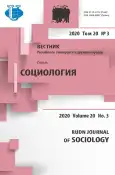Mystification of the highest power: A case of Indonesia
- Autores: Rosyadi K.1
-
Afiliações:
- Trunojoyo University Madura
- Edição: Volume 20, Nº 3 (2020)
- Páginas: 498-508
- Seção: Contemporary society: the urgent issues and prospects for development
- URL: https://journal-vniispk.ru/2313-2272/article/view/322834
- DOI: https://doi.org/10.22363/2313-2272-2020-20-3-498-508
- ID: 322834
Citar
Texto integral
Resumo
In 1998, after the fall of the New Order regime, Indonesia passed through a social, political and economic transition, including a change of power. The first power transition happened in 1999, when Abdurrahman Wahid became the President of Indonesia through the Parliament. The election of Abdurrahman Wahid as the President of Indonesia is inseparable from mystification of power (politics) which he started. The article aims at understanding why Abdurrahman Wahid as the President of Indonesia chose the strategy of power mystification. The study is based on the case study approach. The results of the study show that the strategy of mystification of power was chosen by Abdurrahman Wahid for he could use his social status as the grandson of the founder of the Nahdlatul Ulama (NU) - the largest Islamic organization in Indonesia, which was determined by the NU tradition that children or grandchildren of the kiai had privileges. The Javanese understanding of power is different from the European discourse of power due to the fact that the Javanese explanation of power or leadership cannot be separated from social, political and cultural factors of society or community. Different types of leadership and power are results of differences in social and cultural factors and organization of societies. For the Javanese, power is homogeneous by nature and has the same features wherever it appears. The forms of power are expressions of the same reality, derive from the same source and have the same quality: all forms of power are based on the participation in one force pervading the entire universe. Thus, the Javanese considers individuals and groups that gain power as ‘containers’ that contain a portion of these cosmic forces.
Sobre autores
Kh. Rosyadi
Trunojoyo University Madura
Autor responsável pela correspondência
Email: khoirul.rosyadi@trunojoyo.ac.id
кандидат социологических наук, доцент факультета социальных наук и культурологии
Jl. Raya Telang, Kamal, Bangkalan, Madura, IndonesiaBibliografia
- Anderson B.R. O’G. Language and Power, Exploring the Political in Indonesia. Yogyakarta; 2000.
- Dhofier Z. Pesantren Tradition: Studies of Kiai’s Worldviews. Jakarta; 1994.
- Geertz C. Abangan, Santri, Priyayi in Javanese Societies. Jakarta; 1981.
- Good L. Dictionary of Philosophy. Jakarta; 1996.
- Horikoshi H. A Traditional Leader a Time of Change: The Kijaji and Ulama in West Java. Jakarta; 1987.
- Husain Haikal M. History of the Life of Muhammad. Jakarta; 1989.
- Jatman D. Gus Dur’s circus of diplomacy. Tajuk. March, 2000.
- Johnson D.P. Theories of Classical and Modern Sociology. Jakarta; 1986.
- Kacung M. Quo Vadis NU, After Returning to the 1926 Khittah. Jakarta; 1992.
- Madjid N. The Chambers of Pesantren: A Portrait of Travel. Jakarta; 1997.
- Mulkhan M.A. Trust. Kompas. September 16, 2000.
- Nikulin A.M., Trotsuk I.V., Wegren S.K. The importance of strong regional leadership in Russia: the Belgorod Miracle in agriculture // Eurasian Geography and Economics. 2017; 58 (3).
- Reinhard B. Max Weber: An Intellectual Portrait. New York; 1962.
- Sartono K. Social Dimensions of Leadership. Jakarta; 1990.
- Scott J.C. The Peasants’ Resistance: Yayasan Obor Indonesia. Jakarta; 1993.
- Stephen C.J., Tori H.L. Organizational Behavior. New York; 1997.
- Suseno F.M. Javanese Ethics: A Philosophical Analysis of Javanese Life Wisdom. Jakarta; 1999.
- Timashev N.S. The phenomenon of power. Methodological Works: 1920-1930. Moscow; 2010 (In Russ.).
- Trotsuk I. Discursive construction of social reality: Conceptual foundations and empirical devices for unmasking the “abominable” practices. Sotsiologicheskoe Obozrenie = Russian Sociological Review. 2014; 13 (2) (In Russ.).
- Trotsuk I. Too many Webers for small sociology; or, How critically sociologists should consider their canon. Sotsiologicheskoe Obozrenie = Russian Sociological Review. 2019; 18 (2).
- van Bruinessen M. Traditionalist Muslims in a Modernizing Society: The NU and Indonesia’s New Order Politics, Fictional Conflict, and the Search for a New Discourse. Yogyakarta; 1994.
- Weber M. Economy and Society. Los Angeles - London; 1978.
- Weber M. The Theory of Social and Economic Organization. New York; 1964.
- Woodward M.R. Javanese Islam: Normative Piety, Religious Mysticism. Yogyakarta; 1999.
Arquivos suplementares









